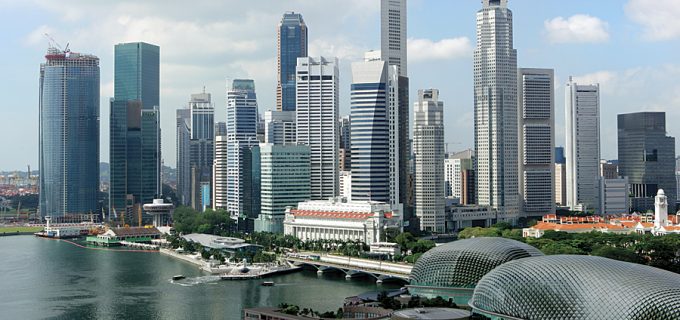Despite its small size, Singapore has successfully developed into an established financial hub with first-world infrastructure and facilities. Yet, it has not ceased in its aggressive determination to continue pushing its economy to greater heights; and has now turned its focus towards nurturing young start-ups, with billions of dollars invested into government subsidised finance programmes, tax exemptions and business incubators etc.
Funding – An Essential Factor for a Start-Up’s Success
Undeniably, this generous availability of funding for young start-ups is one of the key factors that have made Singapore an ideal destination for budding entrepreneurs; and the nation-state’s long standing policy of meritocracy does not disadvantage foreign entrepreneurs either. In fact, some of Singapore’s most successful start-ups such as DocDoc, Tradegecko, Redmart and Luxola were started by foreign entrepreneurs.
Alexis-Horowitz-Burdick, founder of Luxola, experienced the difficulties of having insufficient funding first-hand when she launched her first start-up venture, SweetSpot, which was eventually sold off to a multinational company for the same amount that she invested, when she realised that the business model could not sustain itself with the limited capital she had.
Indeed, start-ups cannot remain content with an initial burst of success; and must continue to explore means to continuously grow and expand – but for start-ups to grow the level of their operations and increase business activities, they require more funding. Given that approximately 57 per cent of businesses obtain fall back on their personal savings to fund their businesses, entrepreneurs who do not have access to a healthy nest egg may find themselves in the same situation as Luxola’s founder.
Sources of Funding

Besides one’s own personal savings and investments made by close friends and relatives, entrepreneurs would typically source funding from the following:
- Private investors / venture capitalist firms / business incubators
- The Government
- Banks
Private Investors / Venture Capitalist Firms / Business Incubators
There are many private investors, venture capitalist firms and business incubators that an entrepreneur can pitch their ideas to, but such funding usually comes with some form of commitment. For example, they may wish to be actively engaged in management decisions, or may request to be allotted shares. However, the advantage is that these private investment groups are usually led by experienced entrepreneurs and business savvy individuals, who may be able to give an entrepreneur sound advice and/or provide a network through which a business can expand its market reach. In fact, one of the most prominent investors in the Singapore scene is Facebook co-founder Eduardo Saverin.
Venture capitalist firms and business incubators such as Golden Gate Ventures, Block 71 and the Joyful Frog Digital Incubator provide an environment where entrepreneurs can congregate together to motivate each other towards success. Another side benefit is that facilities may also be provided to start-ups for a nominal fee.
Read More » Singapore as Third Most Competitive Economy in 2014
Government Financed Schemes
The government also has various financing schemes in place to support local businesses. A snapshot of the various financing schemes and grant schemes that entrepreneurs can apply for, from start-up to internationalisation, are depicted in the table below:
| Start-up | Growth | Internationalisation | |
|---|---|---|---|
| Financing Schemes | Debt-related Schemes | ||
| Micro-Loan Programme (MLP) | Local Enterprise Finance Scheme (LEFS) | Internationalisation Finance Scheme (IF) | |
| Loan Insurance Scheme (LIS) | Loan Insurance Scheme (LIS) | ||
| Equity-related Schemes | |||
| Business Angels Scheme (BAS) | Enterprise Fund | Enterprise Fund | |
| SPRING SEEDS | Growth Financing Programme (GFP) | Growth Financing Programme (GFP) | |
| Grant Schemes | Grants | ||
| Patent Application Fund Plus (PAF Plus) | |||
| Innovation Development Scheme (IDS) | |||
| Locally-based Enterprise Advancement Programme (LEAP) | Patent Application Fund Plus (PAF Plus) | Patent Application Fund Plus (PAF Plus) | |
| Local Industry Upgrading Programme (LIUP) | |||
(information from table above extracted from SME Tool Kit Singapore – Financial Assistance Schemes)
As most of these schemes require companies to meet certain criteria, entrepreneurs are encouraged to either seek professional advice or do adequate research before application under any of these schemes.
Besides these government-financed schemes, there are various tax incentive schemes that business owners can benefit from, as seen in the table below:
| Start-up | Growth | Internationalisation | |
|---|---|---|---|
| Tax Incentives Schemes | |||
| Tax Exemption for Start-ups | Development and Expansion Incentive (DEI) | Double Deduction for Overseas Investment Development Expenditure | |
| Enterprise Investment Incentive Scheme (EII) | Overseas Investment Incentive (OII) | ||
| Pioneer Incentive (PC-M or PC-S) | Overseas Enterprise Incentive (OEI) | ||
| Industrial Exemption Factory Scheme | Licensed Warehouse Scheme (LWS) | Regional/International Headquarters Award (RHQ/IHQ) | |
| Zero GST Warehouse Scheme | Double Tax Deduction for Market Development (DTD) | ||
| Investment Allowance (IA) | Investment Allowance (IA) | Investment Allowance (IA) | |
| Global Trader Programme (GTp) | Global Trader Programme (GTP) | ||
| Expansion Incentive for Partnerships (EIP) | |||
| Supporting Programmes | |||
| Trade Credit Insurance (TCI) Programme | |||
| Warehouse Retail Scheme | |||
| International Partners Programme (iPartners) | |||
| Local Enterprise Technical Assistance Scheme (LETAS) | |||
(information from the table above extracted from SME Tool Kit Singapore – Financial Assistance Schemes and the Inland Revenue Authority of Singapore – Tax exemption scheme for new start-up companies)
Read More Corporate Tax Benefits for Singapore Companies
Banks
Of the five business entities in Singapore, only two, (the limited liability partnership and private limited company) would be considered to be separate legal entities. To banks and financial institutions, the legal status of the business entity is especially important when extending banking or credit facilities. Sole proprietorships and partnerships are typically excluded, with the exception of a few term loans that require guarantors and detailed documentation to evidence that the sole proprietorship or partnership has the ability to re-pay the loan within the stipulated period.

Read More Comparison of Different Types of Business Entities in Singapore
Private limited companies can benefit from the Micro-Loan Scheme, which are offered by local banks such as DBS, OCBC and UOB. The risks associated with these loans are split between the local banks and the Standards, Productivity & Innovation Board (SPRING Singapore). By lowering the banks’ risk, banks have been more willing to provide these collateral-free loans without imposing too many obstacles to young companies, who often do not have a track record or sufficient documentation to obtain loans.
A snapshot of the business loan schemes offered by the three banks and their eligibility requirements are summarised in the table below:
| DBS | OCBC | UOB | |
|---|---|---|---|
| Eligibility Requirements | Business is registered and operating in Singapore for less than 3 years | Business is registered in Singapore and operating for at least 6 months but less than 3 years | Business is registered and operating in Singapore |
| 30% of shares owned by a Singaporean or Singapore Permanent Resident (“PR”) | 30% of shares owned by a Singaporean or Singapore Permanent Resident (“PR”) | 30% of shares owned by a Singaporean or Singapore Permanent Resident (“PR”) | |
| Less than 10 employees or annual turnover not exceeding S$1 million | Less than 10 employees or annual turnover not exceeding S$1 million | Less than 10 employees or annual turnover not exceeding S$1 million | |
| One guarantor must be a Singaporean or PR aged between 21 and 62 | Company’s Group Annual Sales of not more than S$100 million or company’s Group Employment Size of not more than 200 | ||
| Maximum Loan amount | S$100,000 for four years from 5.50% p.a. | S$100,000 | S$100,000 for four years at a fixed interest rate of 5.5% p.a. |
Business Friendly Environment
Another essential key attraction of the small city-state is its vibrant and dynamic business environment. As noted by Cameron and Bradley Priest, founders of Tradegecko who relocated from New Zealand to Singapore in order to start their business, while New Zealand may be a wonderful country to live in, its remoteness, slower pace and emphasis on lifestyle was not conducive to do business. Similarly, while financial hubs such as Sydney were closer to home, the Priest brothers felt that it still suffered from “a small town feel and mentality”.
Indeed, compared to its peers in the Asia-Pacific region, there are many reasons why Singapore has maintained the top rank globally for the last ten consecutive years in the World Bank’s Ease of Doing Business Report, which surveys 189 economies across the globe. A snapshot of the accolades and achievements that Singapore has been recognized for is summarized in the infographic below:

Read More » 2015 Singapore Business Rankings
Ultimately, given the many benefits and incentives for entrepreneurs, it would be wise to consider Singapore as a potential destination to locate their start-up. However, as with all business decisions, entrepreneurs should carefully consider all aspects of the business and its intended market. Examples of areas that entrepreneurs may wish to consider are:-
- Using Singapore as a launchpad to reach out to the Asian markets
- Tax Planning in Singapore
- Company setup Options for Foreigners
- Statutory Compliance in Singapore
Nevertheless, with its pro-business policies, tax incentives and strong government support, entrepreneurs will find that Singapore is an ideal starting ground for a start-up to grow and expand its market reach to the region and beyond.
Related Reading » Singapore Company Setup
Planning to set up a Singapore company?
You may also call us at +65 6850 5280 for a free consultation.Contact Us





